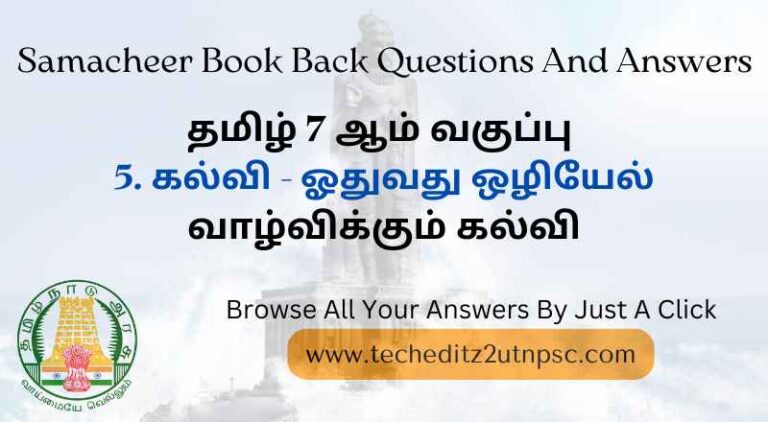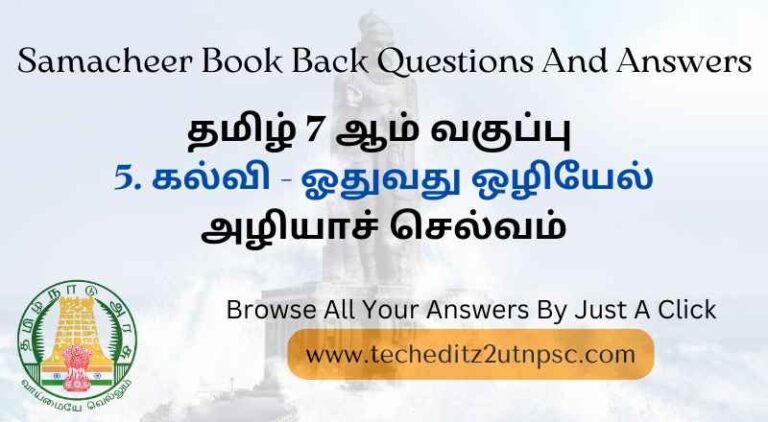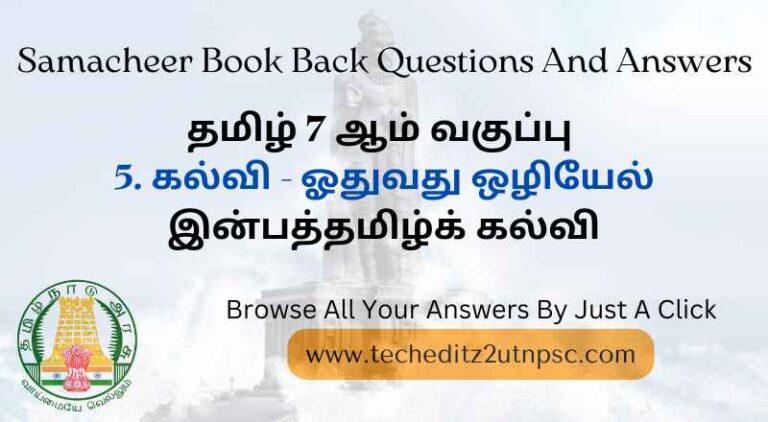support@techeditz2utnpsc.com | 8300-921-521

Plant and Animal Hormones
Samacheer Book Back Questions And Answers For Science Standard 10 “Plant and Animal Hormones“
I. Choose the correct answer:
1. Gibberellins cause:
a) Shortening of genetically tall plants
b) Elongation of dwarf plants
c) Promotion of rooting
d) Yellowing of young leaves
2. The hormone which has positive effect on apical dominance is:
a) Cytokinin
b) Auxin
c) Gibberellin
d) Ethylene
3. Which one of the following hormones is naturally not found in plants:
a) 2, 4-D
b) GA3
c) Gibberellin
d) IAA
4. Avena coleoptile test was conducted by
a) Darwin
b) N. Smit
c) Paal
d) F.W. Went
5. To increase the sugar production in sugarcanes they are sprayed with _____.
a) Auxin
b) Cytokinin
c) Gibberellins
d) Ethylene
6. LH is secreted by
a) Adrenal gland
b) Thyroid gland
c) Anterior pituitary
d) Hypothalamus
7. Identify the exocrine gland
a) Pituitary gland
b) Adrenal gland
c) Salivary gland
d) Thyroid gland
8. Which organ acts as both exocrine gland as well as endocrine gland
a) Pancreas
b) Kidney
c) Liver
d) Lungs
9. Which one is referred as “Master Gland”?
a) Pineal gland
b) Pituitary gland
c) Thyroid gland
d) Adrenal gland
II. Fill in the blanks:
1. _____ causes cell elongation, apical dominance and prevents abscission.
2. _____ is a gaseous hormone involved in abscission of organs and acceleration of fruit ripening.
3. _____ causes stomatal closure.
4. Gibberellins induce stem elongation in _____ plants.
5. The hormone which has negative effect on apical dominance is _____.
6. Calcium metabolism of the body is controlled by _____.
7. In the islets of Langerhans, beta cells secrete _____.
8. The growth and functions of thyroid gland is controlled by _____.
9. Decreased secretion of thyroid hormones in the children leads to _____.
Answers:
1. Auxin
2. Ethylene
3. Phytohormone abscisic acid
4. rosette
5. cytokinin
6. parathormone
7. insulin
8. thyroid stimulating hormone
9. cretinism
III a) Match Column I with Columns II and III
Column I Column II Column III
1. Auxin Gibberella fujikuroi Abscission
2. Ethylene Coconut milk Internodal elongation
3. Abscisic acid Coleoptile tip Apical dominance
4. Cytokinin Chloroplast Ripening
5. Gibberellins Fruits Cell division
Answers:
1. Auxin – Coleoptile tip – Apical dominance
2. Ethylene – Fruits – Ripening
3. Abscisic acid – Chloroplast – Abscission
4. Cytokinin – Coconut milk – Cell division
5. Gibberellins – Gibberella fujikuroi – Internodal elongation
III b) Match the following hormones with their deficiency states Hormones Disorders
1. Thyroxine A. Acromegaly
2. Insulin B. Tetany
3. Parathormone C. Simple goitre
4. Growth hormone D. Diabetes insipidus
5. ADH E. Diabetes mellitus
Answers:
1. C
2. E
3. B
4. A
5. D
IV. State whether True or false, If false write the correct statement
1. A plant hormone concerned with stimulation of cell division and promotion of nutrient mobilization is cytokinin.
2. Gibberellins cause parthenocarpy in tomato.
3. Ethylene retards senescence of leaves, flowers and fruits.
4. Exopthalmic goiter is due to the over secretion of thyroxine. –
5. Pituitary gland is divided into four lobes.
6. Estrogen is secreted by corpus luteum.
Answers:
1. True
2. True
3. False (Ethylene hastens senescence of leaves, flowers and fruits)
4. True
5. False (Pituitary gland is divided into three lobes)
6. False (Estrogen is secreted by the graffian follicles of the ovaries)
V. Assertion and Reasoning:
1. Assertion (A): Application of cytokinin to marketed vegetables can keep them fresh for several days.
Reason (R): Cytokinins delay senescence of leaves and other organs by mobilisation of nutrients.
a. If both A and R are true and R is correct explanation of A
b. If both A and R are true but R is not the correct explanation of A
c. A is true but R is false
d. Both A and R are false
2. Assertion (A): Pituitary gland is referred as “Master gland”.
Reason (R): It controls the functioning of other endocrine glands.
a. If both A and R are true and R is correct explanation of A
b. If both A and R are true but R is not the correct explanation of A
c. A is true but R is false
d. Both A and R are false
3. Assertion (A): Diabetes mellitus increases the blood sugar levels.
Reason (R): Insulin decreases the blood sugar levels.
a. If both A and R are true and R is correct explanation of A
b. If both A and R are true but R is not the correct explanation of A
c. A is true but R is false
d. Both A and R are false
Visit Our YouTube Channel For More Free Videos: Click Here


